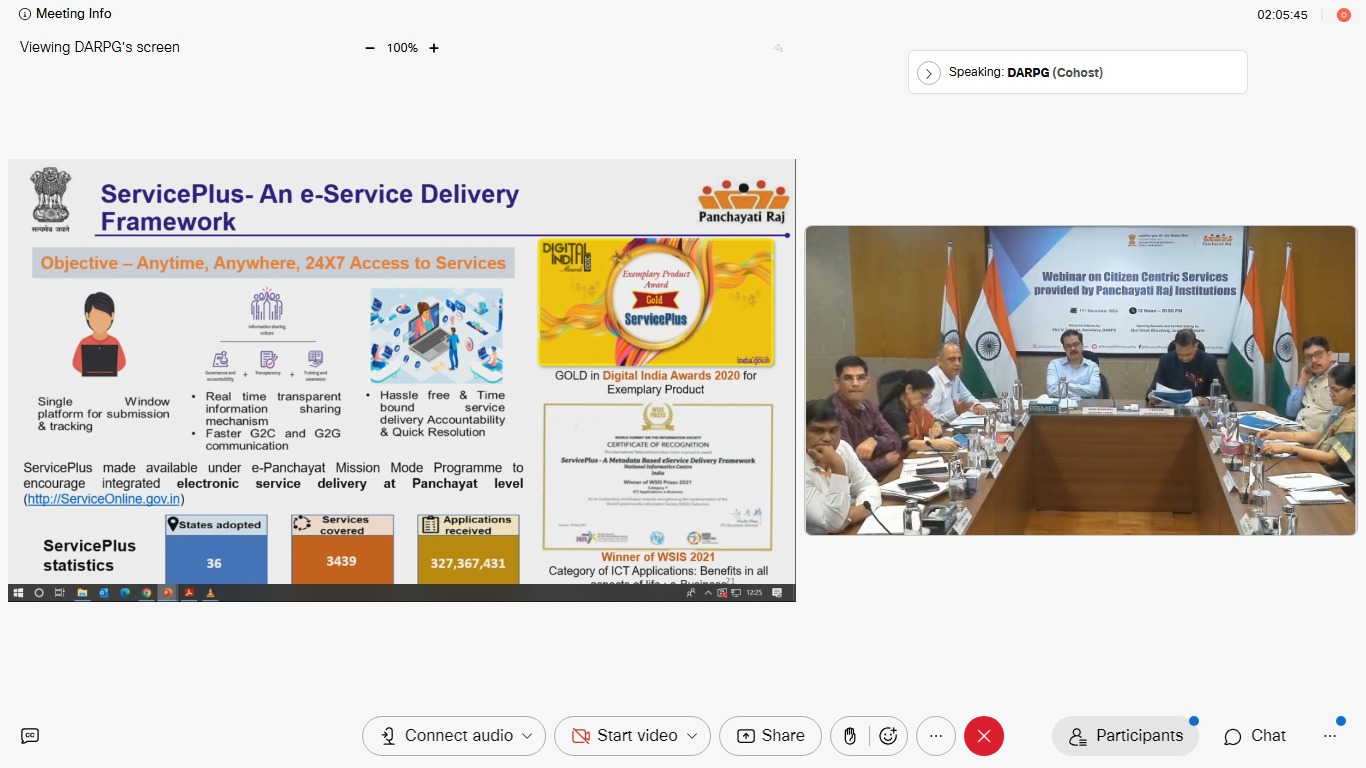Ministry of Panchayati Raj

Driving Digital Inclusion: Panchayati Raj Institutions Lead with Citizen-Centric Service Delivery; Webinar focused on Digital Integration
Karnataka, Gujarat and Kerala Exemplify Digital Governance Innovations in Panchayati Raj
Posted On: 12 NOV 2024 11:41AM by PIB Delhi
A Special Webinar on “Citizen-Centric Services provided by Panchayati Raj Institutions” was held on 11th November 2024 under the National e-Governance Webinar Series (NeGW 2023–24), jointly organized by the Ministry of Panchayati Raj (MoPR) and the Department of Administrative Reforms and Public Grievances (DARPG). The webinar served as a vital platform for discussing the transformative impact of digital solutions in enhancing service delivery in rural India, with special emphasis on creating an inclusive, accessible and citizen centered governance model for rural communities. It saw widespread participation from Gram Panchayats and PRI representatives from across the country.
In his address, Shri Vivek Bharadwaj, Secretary, Ministry of Panchayati Raj, underscored the significant role of digital integration in streamlining rural service delivery. He highlighted the Ministry’s commitment to empowering Panchayati Raj Institutions (PRIs) through unified, multi portal solutions that make it easier for rural citizens to access essential services. By integrating various service delivery portals, he noted, PRIs can simplify access, increase efficiency, and foster a modern, responsive rural governance framework. Shri Bharadwaj described this effort as a critical step towards the Ministry’s overarching vision of inclusive, sustainable rural development.
C6RC.jpeg)
Shri V. Srinivas, Secretary of DARPG, opened the special webinar by emphasizing on the importance of citizen-centric governance as the foundation of the Panchayati Raj system. He commended the pivotal role of PRIs in bringing essential services to the rural populace and recognized state-led initiatives, including Karnataka’s Panchamitra, Gujarat’s eSeva, and Kerala’s ILGMS, as benchmarks for effective digital governance. These models, he noted, showcase how PRIs can enhance transparency, accessibility, and direct service provision to citizens, serving as a template for digital governance across rural India.
BP2H.jpeg)
While Shri Alok Prem Nagar, Joint Secretary (Governance), Ministry of Panchayati Raj, further elaborated on the Ministry’s recent digital advancements, including the Citizen Charter Campaign of 2021, aimed at ensuring that rural citizens have seamless access to essential services such as certifications and MGNREGA benefits. He stressed the importance of digital interventions, combined with robust Panchayat-centered strategies in building a responsive, people-focused rural administration that addresses the unique needs of rural citizens. The webinar aimed at establishing a digitally enabled, citizen-centric rural governance model and reflected the broader vision of “Viksit Bharat,”. Through collaboration, innovation, and shared best practices, the Ministry of Panchayati Raj continues to foster an environment where Panchayats stand at the forefront of progress, delivering services that prioritize efficiency, transparency, and accessibility for all rural citizens.
FP5I.jpeg)
959B.jpeg)

Senior officers from various States, including Smt. Uma Mahadevan, Additional Chief Secretary (Panchayati Raj), Karnataka; Shri Gagandeep Singh Bedi, Additional Chief Secretary (Panchayati Raj), Tamil Nadu; Smt. Sharmila Mary Joseph, Principal Secretary (Panchayati Raj), Kerala; Smt. Mona Khandhar, Principal Secretary (Panchayati Raj), Gujarat; Shri Lokesh Kumar, Principal Secretary (Panchayati Raj), Telangana; and Shri Eknath Dhawale, Principal Secretary (Panchayati Raj), Maharashtra, shared practical insights on effective service delivery at the Gram Panchayat level. They noted that urban local bodies in Karnataka, Kerala, and Gujarat are now exploring the adoption of best practices from rural local body systems, aiming to enhance governance and service efficiency across urban and rural areas. Their contributions reinforced the significance of sharing best practices and learning across States, building a stronger, more resilient governance framework at the grassroots.
****
AA
(Release ID: 2072631) Visitor Counter : 41




















